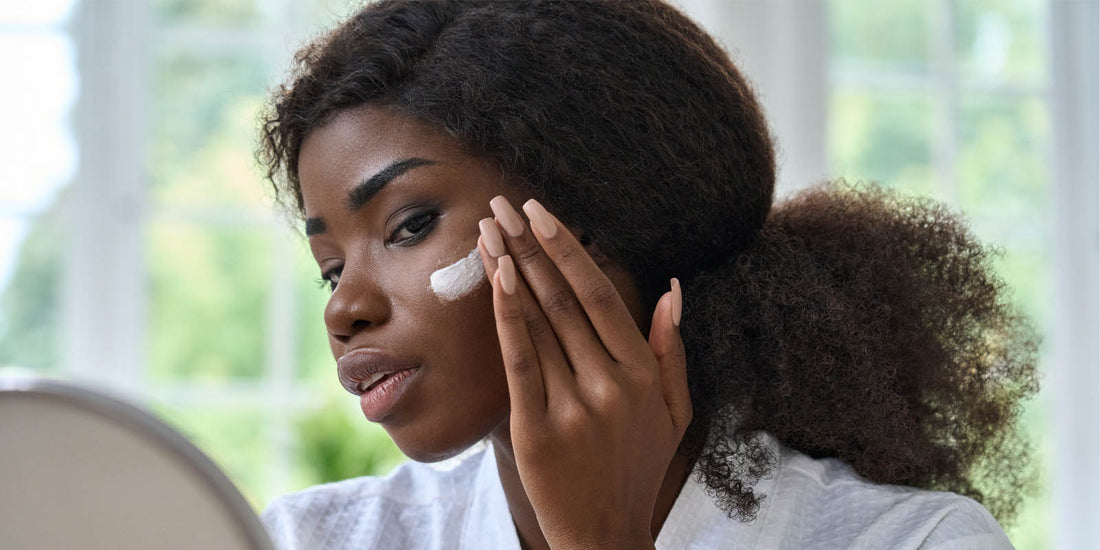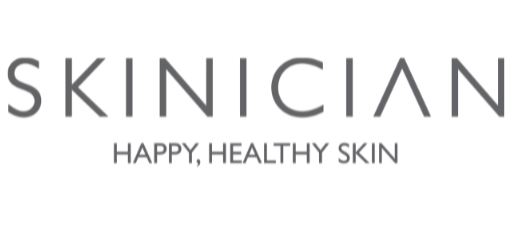
Vitamins to Take & Apply to Help Combat Oily Skin
Share
Skincare isn't one size fits all. But there are accessible ways to nurture your well-being and transform oily skin into a radiant glow. In this article, we share the most effective vitamins to help oily skin and how to include them within your diet and skincare regime.
First, let's dive into sebum's vital role in keeping our skin happy, healthy and balanced.
What is Sebum?
Sebum is a natural oil produced by the sebaceous glands. It typically appears as a waxy residue on the skin's surface. Sebum lubricates and protects the skin, combats inflammation, transports antioxidants to the skin's surface and locks in moisture. The sebaceous glands can sometimes under or overproduce sebum resulting in skin concerns.
What Are the Causes of Oily Skin
One of the root causes of oily skin is an overproduction of sebum, resulting in a greasy shine on the skin's surface caused by the excess oil. Here are a few internal and external factors that can contribute to sebum overproduction.
Genetics
If sebum overproduction runs in your family, you're more likely to experience oily skin. It can seem a bit disheartening, but even if your oily skin is hereditary, you can take steps to reduce excess sebum and manage your skin concerns.
Hormones
Any changes to the natural balance of your hormones can cause oily skin. Anything from stress, the menstrual cycle, pregnancy, or specific medications can stimulate excess sebum production.
While too much cortisol (the stress hormone) plays a part in this process, the main hormones responsible for oily skin are androgens like testosterone. Androgens are generally at their peak during puberty. However, oilier skin can occur at any age.
Top tip: Consult your doctor to identify whether hormonal fluctuations or imbalances are at the root of your oily skin.
Diet & Hydration
Our dietary choices can positively or negatively impact our skin health and overall well-being. Dairy products, fried foods, foods high in sugar or salt, and alcoholic drinks are all linked to sebum overproduction.
It's also important to stay hydrated because when you don't drink enough water, your body will try to offset the lack of fluid intake by producing excess sebum.
Top tip: Try swapping dairy milk for soy milk. Not only will this help with dairy-related sebum overproduction, but soy products have also been shown to lower testosterone in the body.
Incorrect Skincare
A daily skincare routine that isn't the right fit for your skin type (or a lack of a regime) can encourage excessive sebum production.
If your skincare products and makeup are oil-based, they're more likely to block your pores leading to oily skin. Or if they contain too much alcohol, this can dry your skin, causing an overproduction of oil in response.
Meanwhile, if you don't moisturise or use the incorrect moisturiser for your skincare needs, you can further agitate greasy skin.
“A common misconception is that if you have oily or acne-prone skin, you should dry it out! But actually this will only make your skin react by producing more oil to clog pores and make matters worse.” - SKINICIAN Co-founder Hilary McMurray
Using the wrong exfoliator or cleanser and not removing your makeup before bed can also cause skin concerns.
Top tip: Learn about your individual needs to find results-driven skincare solutions for oily skin and follow a routine that supports your skin type.
Overwashing
Not cleansing your face can lead to blocked pores and excessive sebum. However, washing your face too much (more than twice a day) strips away the skin's natural oils. The sebaceous glands then produce more oil to overcompensate.
Top tip: Your skincare routine doesn't have to be complex and can complement a busy lifestyle. Cleansing your face morning and night with a multifunctional and gentle cleanser for oily skin is a quick way to discourage excess sebum.

SKINICIAN Purifying Cleansing Gel
£21 / €26.50
Vitamins to Take or Apply to Reduce Sebum Production
Discover the most effective vitamins that reduce sebum production in the body and control oily skin. We show you how to introduce them into your system through your diet, via a skincare routine for oily skin, or both.
Note: To address the root causes of sebum overproduction, pair the following dietary and skincare recommendations with a healthy lifestyle that supports your body's needs.
Vitamin A
Vitamin A is a crucial vitamin for maintaining healthy skin. It's ripe with Retinol and pro-vitamin A carotenoids. These help to maintain overall skin well-being, promote skin cell regeneration and combat acne. Vitamin A also helps to reduce excess sebum production by increasing cell turnover.
Vitamin A in the Diet
Vitamin A is key to a healthy diet. Though it's tempting to turn to supplementation, this vitamin can be toxic when consumed at high doses - above 1.5 mg (1,500 µg) per day -. So it's safer to supply your system with vitamin A through your diet. Fish, sweet potatoes, and carrots are a few foods rich in vitamin A.
Vitamin A in Skincare
Retinol is a vitamin A derivative used in skincare to promote general skin health and transform excess oil into a healthy glow. A retinol cream for oily skin can be a multifunctional allrounder while healing acne breakouts caused by excess sebum.
Results in action:
"My 58yo face normally breaks out at night time creams as they're too thick and heavy and just sit there, but this is totally different... it's given me a radiance and evenness of tone, pores etc." - Cari
SKINICIAN Overnight Retinol Powerbalm
£61.50 / €77
Vitamin B
Most B vitamins are beneficial for oily skin; however, some specific examples are:
- B5 (pantothenic acid) partners with CoEnzyme A to help remove excess sebum, unclog your pores and prevent acne.
- B6 is helpful for people with hormone-induced oily skin (sebum overproduction linked to your menstrual cycle or if you're menopausal, for example).
Vitamin B in the Diet
You can access B6 in your diet by consuming oats, bananas, and poultry like chicken. Avocados and beef are rich in pantothenic acid (B5).
Vitamin B in Skincare
Consider a pro-vitamin B5 infused purifying mask to deep cleanse oily skin, gently remove excess sebum and soothe any redness caused by breakouts.
Results in action:
"I find this mask is amazing for the congested areas of my skin…It brings down the inflammation and mattifies the area making it easier to apply makeup that lasts." - PH
SKINICIAN Purifying Mask
£27 / €34
Vitamin C
Vitamin C is crucial for maintaining healthy skin and aiding collagen production. It also has wound healing properties, making it beneficial if you suffer from breakouts caused by oily skin. All-in-all, vitamin C can lead to brighter and healthier skin.
Vitamin C in the Diet
As the body can't store Vitamin C, you should include it in your daily diet. To enjoy a diet rich in vitamin C, have potatoes, broccoli, peppers, citrus fruits and strawberries in your meal plans.
Vitamin C in Skincare
A soothing purifying toner for oily skin infused with vitamin C and supported by zinc PCA can help people manage acne breakouts caused by excess oil at any age.
“This toner is so amazing, left my skin feeling refreshed, and skin felt less oily. It also helped with reducing breakouts and redness.” - Katka

SKINICIAN Purifying Toner
£21 / €26.50
Vitamin D
Vitamin D is a fat-soluble vitamin that works alongside our sebaceous glands to regulate sebum production. Vitamin D helps our bodies protect against insulin resistance which can lead to oily skin as insulin stimulates the overproduction of sebum. So a sufficient amount of vitamin D in the system can help reduce excess oil production.
Vitamin D in the Diet
To increase the presence of vitamin D in your diet, consume oily fish like salmon and mackerel, egg yolks and red meat. Some fortified foods like breakfast cereals also contain added vitamin D. You can also increase your vitamin D intake through supplementation.
A Bonus Mineral for Oily Skin
Your body needs vitamins and minerals to carry out the everyday processes essential for well-being. Minerals (zinc in particular) also support the work vitamins do to maintain skin health, including controlling oily skin.
Zinc
Zinc helps the work of vitamin A, one of the most effective vitamins for restoring skin health and regulating sebum production. It's also known to help balance sebum production by decreasing the number of androgens in the body.
Zinc in the Diet
Zinc is a trace mineral, so we only need a small amount in our system. You can incorporate zinc into your diet by consuming lentils, shellfish and red meat.
Zinc in Skincare
A lightweight and purifying day moisturiser for oily skin supercharged with zinc PCA can help balance your skin's oil production, combat acne and mattify shine-prone areas like the T-Zone.
> See our favourite zinc products for oily skin.
Results in action:
"I think this is the best SPF moisturiser for oily skin I have ever used. Not only did it help clear and prevent breakouts, but it also stopped my skin from being oily and smoothed my pores." - Steph

SKINICIAN Purifying Day Moisturiser SPF 30
£25 / €31.50
How to Control Oily Skin: The Bottom Line
Oily skin is often caused by an overproduction of sebum in the sebaceous glands. While sebum is perfectly natural and healthy, getting to the root cause of excess oil will help you better control oily skin.
Causes of sebum excess can range anywhere from genetics to hormonal fluctuations caused by stress or incorrect skincare. Whether your skin type is hereditary or lifestyle related, a healthy diet and skincare regimen full of vitamins for oily skin can help.
For more articles to help combat oily skin, read:
- Oily Skincare Routine
- How to Reduce Oily Skin
- Best Skincare Products to Use on an Oily Face
- Transformative Skincare Ingredients for Oily Skin
- Oily Skincare Routine and Tips for Women in Their 40s
- The Best Cleanser for Oily Skin
Or read real life oily skin journeys:




